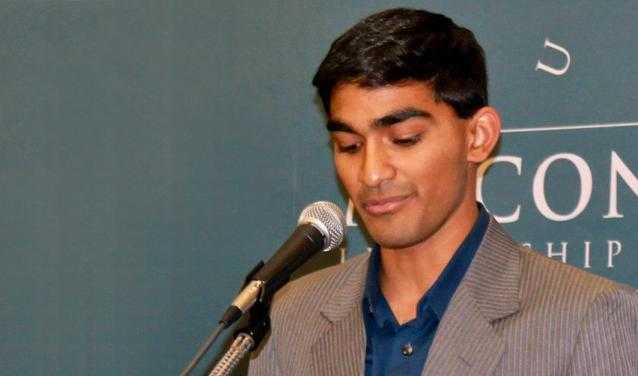Home>“There's a freedom here that I didn't have back home”

24.04.2016
“There's a freedom here that I didn't have back home”
An American student at the Sciences Po School of Public Affairs in the Master of Public Policy, Arsh Haque talks about his motivations for studying in France, his early days in Paris and everyday life on the Sciences Po campus.
What are you most enjoying about your experience at Sciences Po?
The international student body. Before coming to Sciences Po I went to a conference on dystopian literature in North Carolina and we talked about an old model for storytelling, you see it in Twenty Thousand Leagues Under the Sea – you form a ragtag team, a professor, a seaman, a Conseil, and you take on a mission of mythic proportions. And that's what it feels like. You have former central bankers and armchair philosophers, people from Nigeria and Tokyo, Mexico and Oxford, representation from a fractal of political ideologies, different in every way except for a shared ambition to better the world. There is something between the plurality of identity and singularity of purpose that makes it an adventure to work alongside them. An adventure I very much enjoy. I go to class and paint the ville red knowing that it’s with these very characters that I'll be fighting the good fight somewhere down the line.
What made you decide to study in France, and why at Sciences Po?
My dad taught me to apply corporate techniques to decision-making – to map out value chains and apply cost-benefit analysis – and to treat every opportunity like it was a Six Sigma consulting gig. Sciences Po hit the mark – it melded history and prestige and offered the social capital to work with in negotiations, applications, and networking; the School of Public Affairs had the vigor of a new-born program, one with a save-the-world ethos and without the naivety; and it boasted an international cohort that wouldn't just teach globally, it would give me a global experience.
My mom taught me intuition, that the best policymakers are artists, that beauty is what drives the entrepreneurial spirit. So it wasn't just Sciences Po, it was Paris, it was France. I come from rolling hills, tobacco farms, and suburban metropolises – the idea of studying here was to plunge into a new aesthetic, into the archetype of a new form, a place where I could be swept across centuries of artistic movements with a stroll along the Seine.
It was the meeting of those two worldviews, of those two virtues that brought me here.
Has anything surprised you about the course, or life in France?
There's a freedom here that I didn't have back home. Back home when I thought of new approach, a new way to do something, something that's never been done before, I would spend two-thirds of my energy just trying to convince administrators to entertain the idea. Here the academic advisers and professors help me dive straight into the mechanics of how to make it happen. Back home I'd have to spend six hours and a full tank of gas to feel like I've entered a new land. Here it can be as close as a few metro lines away. Here I have five organic grocery stores, four bike shops, and two sushi places within a five minute walk. Here I can traverse the entirety of a cosmopolitan metropolis on a public transit bike. There are so many barriers I thought immutable, the natural, urban laws, but here they just don't exist.
Is there anything you’ve found more difficult to adapt to?
I don't speak French. And if it isn't obvious, yet, I'm accustomed to the long-winded, Virginia Woolf variety of communication. So having my vocabulary, my tools of connection truncated to paltry phrases and the willing Anglo-Saxon friendly population – it's been a challenge. The mundane became Herculean – getting a cellphone or bank account turned into all-day, intellect-taxing affairs. I had to focus on getting the right punch out of a few words said a few times instead of steamrolling with open oratory. There is growth in the struggle, a grace of relying on the kindness and abilities of others, of simplifying my words and eventually my thoughts – but it's been difficult, for sure.
What would you like to do after graduating?
I plan on working with extra-curricular programs with a focus on interventions that use experiential learning, that teach behaviors and preferences like civic leadership and critical thinking. I want to show that there's more to education than test scores, that there are programs out there, "value" programs, that are building the health, wealth, and democracy of the next generation. I want to quantify the wellbeing outcomes, find and spread the best methods, and help facilitate funding into their coffers. I've narrowed it down to a few PhD programs and NGOs that fit the bill.
Do you have any advice for other students considering studying abroad in France?
It won't be enough. Give yourself logistical space to breathe, to get swept away by the city, country, program, and people and take the unlikely internship that keeps you here a little longer, that bleeds into a gap year or a second degree and ends up with a French network that keeps you coming for years to come. Don't squeeze it in, don't cram it between lines of a résumé. You'll just end up with an non-refundable ticket home and a smirk. But that's not so bad, either. So better yet, however you get here – pinpoint-scheduled or Summer of Love free falling – just make sure you get here.
Related link